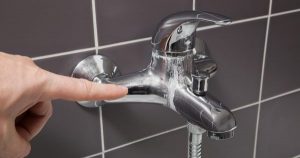What Is Hard Water?
Basically, hard water is the result of minerals being dissolved in the liquid.
All kinds of minerals can end up being suspended in the water, but the most common ones by far are calcium and magnesium.
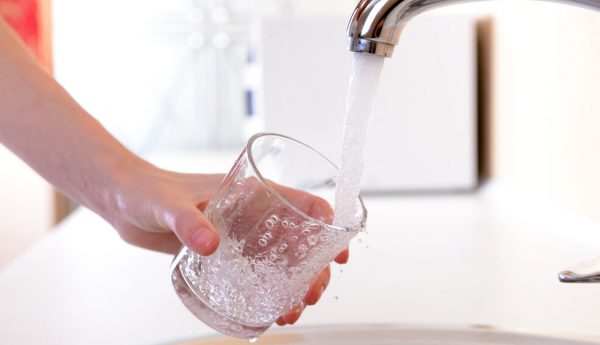
Note that the hardness of water can be variable and that it changes depending on the number of minerals present in it.
Where Does Hard Water Come From?
Hard water emerges when the water comes into contact with a surface it can gradually dissolve.
If that surface in question contains minerals that can remain in the water, then the hardness of the water will increase.
Among the main sources of hard water is water coming into contact with limestone. Limestone contains plenty of calcium and magnesium deposits that can get swept up by the water.
Water that interacts with soil in some way is also likely to present at least some amount of mineral content.
It’s worth pointing out that larger bodies of water can be a source of hard water. Rivers and lakes in particular are known to contain minerals. If they are part of your water source, you probably have hard water at home.
An older plumbing system can also affect the water’s hardness level. The metal used in old pipes can dissolve over time and start falling into the water.
Is Hard Water Safe To Drink?
From a health standpoint, drinking hard water is not going to be a problem for the most part. If anything, you may even benefit from ingesting the traces of calcium and magnesium that are found in hard water.
Magnesium plays an important role in maintaining a healthy heartbeat while calcium is also lauded for its ability to strengthen your bones. Individuals who are lactose-intolerant may even benefit more from drinking hard water.
If there is a health concern related to the regular consumption of hard water, it is possible development of eczema.
The World Health Organization (WHO) points out that hard water “has been suggested to be a risk factor that could exacerbate eczema.”
Common Hard Water Problems
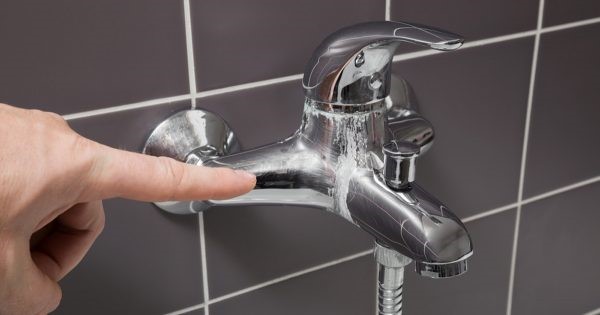
Problems related to having hard water at home vary in terms of how challenging they can be to deal with.
- Water Stains – Hard water can cause small spots and specks to appear on different items and fixtures you have at home. These stains are unsightly and it will require a bit more effort to clean them up.
- Residue on Your Body – The minerals in hard water will make your hands feel more slippery after washing. They can also cause your hair to dry out faster.
- Increased Usage of Detergent and Soap – Since hard water residue is now consistently left behind on your body and belongings, you will likely end up having to use more detergent and soap to clean them properly.
- Unpleasant Scent and Flavor – The scent and flavor of hard water differ significantly from regular tap water. You may be less inclined to drink hard water because of that.
- Less Efficient Water Heaters – Water heaters have a tougher time warming up water containing minerals. The cost of enjoying warm water in your home will likely go up because of hard water.
- Appliances Malfunction Faster – The mineral contents in hard water can affect more than just the human body. They can also permeate the internal components of the appliances you have at home. This time around though, the minerals will no longer be beneficial.
- Problems with Pipes – According to the United States Geological Survey, hard water moving through pipes over a long period of time can lead to a problem known as scale buildup. As the scale buildup intensifies, it will be tougher for the water to flow freely into your home. It damages appliances such as dish washer, misting system and shower head.
How To Test For Hard Water?
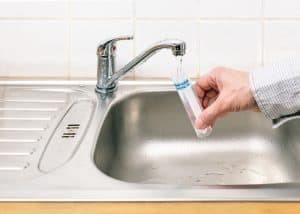
If the potentially negative effects of hard water are troubling you, it may be time to see if you do have hard water at home.
There are two tests that could help to identify the hardness of your tap water.
- Laboratory Test
- DIY Test Kits
Laboratory Test
Arguably the simplest way to get your water’s hardness level tested is to have it sent to a laboratory.
Most laboratories will have advanced equipment to precisely identify the hardness level of your tap water.
Ask for better deals to perform a thorough check on the content of your tap water which includes water hardness, pH and contaminants.
DIY Test Kits
You can also opt for a DIY testing kit to perform the test at home if you are in a tight budget.
The accuracy is not as great as getting a laboratory test, but it should provide a great understanding of how hard is your tap water.
Interprete The Test Results
Water hardness is conveyed in different ways. The most common way to interpret is by measuring the concentration of calcium carbonate in terms of milligrams per liter (mg/L).
| Mg/L or PPM | Classification |
| 0 – 60 | Soft Water |
| 61 – 120 | Moderately Hard Water |
| 121 – 180 | Hard Water |
| 180 and above | Very Hard Water |
Anywhere on the “Moderately Hard Water” and below are preferable. However, the softer the better for the household.
How To Solve Hard Water?
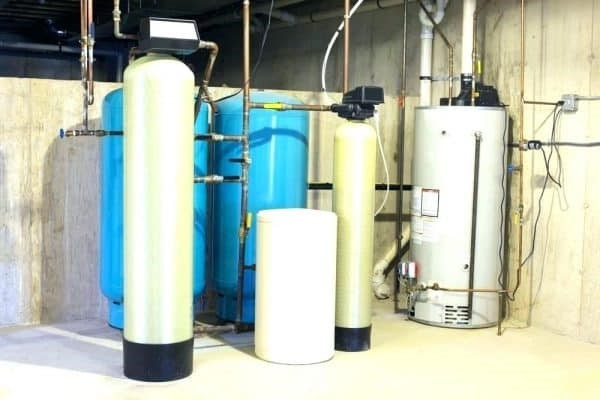
There are four commonly used products in the market to resolve hard water problems.
- Salt-Based Water Softeners
- Salt-Free Water Softeners
- Electronic Descaler
- Shower Head Water Filters
Salt-Based Water Softeners
Salt-based water softeners are commonly used and generally more effective than the other options. It is installed on the inlet of the pipe to the entire house.
As the hard water passes through a resin bed of the water softener, the hard ions previously present in the water will be swapped out for soft ions.
The resin bed will be filled up with hard ions and needed salt to clean and rinse it before the softener can function like normal again. This is called a regeneration process.
Salt-Free Water Softeners
Salt-free water softeners are known as water conditioners, and they function quite differently from the items mentioned above.
Scales and buildups occur when the hard mineral ions bind to each other. The system alters the hard mineral ions into crystal structures to prevent this formation.
This method doesn’t demineralize the hard water but rather alters the forms. Similar to salt-based water softeners, it is installed next to a whole-house water filter.
Electronic Descalers
The electronic descaler is the latest technology used in dealing with hard water.
The coils of the descaler wrap around the pipe and use a magnetic force to break the bonds of the hard minerals. Similar to salt-free water softeners, they don’t demineralize the water.
One thing good about this method is it will not involve any plumbing work, maintenance as well as downtime for servicing. You just need electricity to get it working.
Shower Head Water Filters
There are several shower head water filters available on the market.
Carbon-based and KDF are commonly used on showerheads to remove the hard water minerals alongside chlorine, chloramine and heavy metals.
In addition, you often see Vitamin C used in the shower head to improve the healthiness of the skin and hair scalp
Hard Water VS Soft Water
You probably heard of me mentioning soft water. So what is it?
What Is Soft Water?
Soft water lacks the same minerals that are present in hard water. Soft water often originates from bodies of water that are occupied by rocks that do not dissolve as easily in water, which explains the lack of mineral content in the liquid water.
The term soft water has also often been used to refer to water that has undergone the softening process.
Let’s Compare
Let us now compare the properties of hard and soft water by looking at specific points.
| Comparison | Hard Water | Soft Water |
| Mineral Content | Contains calcium and magnesium. | Normally it is just salt water. |
| For Cleaning | More detergent will be used. | No residue was left behind. |
| For Showering | Slippery feel on hair after a shower. | Use less shampoo and soap. |
| For Drinking | Beneficial minerals calcium and magnesium. Unpleasant taste. | Salty water is treated with a salt-based water softener. |
| Water-based Appliances | Clog pipe, damaged appliances. | Doesn’t pose a risk to appliances. |
Mineral Content
Hard water is teeming with minerals such as calcium and magnesium, whereas you will struggle to find any content of that kind in soft water.
For Cleaning
Soft water is preferred for cleaning around your home. With its lack of mineral content, you can clean using soft water and not worry about leaving residue behind.
If you use hard water for cleaning, you will have to use more detergent to achieve the same level of cleaning along with other items.
For Showering
Once again, soft water is better for showering because it does not contain minerals that can adversely affect your hair.
The minerals that are typically found in hard water are known for drying out hair while also making your skin feel slippery.
For Drinking
This time, the minerals in hard water are good to have around. You can enjoy more health benefits from drinking hard water.
The only thing you’ll have to contend with is the at times unpleasant scent and taste of hard water.
Naturally, soft water may not even be palatable because of how salty it is. At the very least, you should drink softened water if you would prefer to steer clear of hard water.
Water-based Appliances
The minerals present in hard water can clog up your pipes, and water fixtures, and also deal lasting damage to your appliances. You won’t face the same problem if soft water entered your house.
Wrap Up
Hard water is not necessarily a bad thing. If you want to receive more nutrients from your water, you can even argue that it is better to rely on hard water.
However, the short-term benefits of using hard water can be outweighed by the long-term damage it can cause to your home and the appliances inside of it.
Weigh those factors carefully before deciding if you should continue using hard water or shift to something else.
Check out our list of best water softener system to help solve your hard water problems at home.
